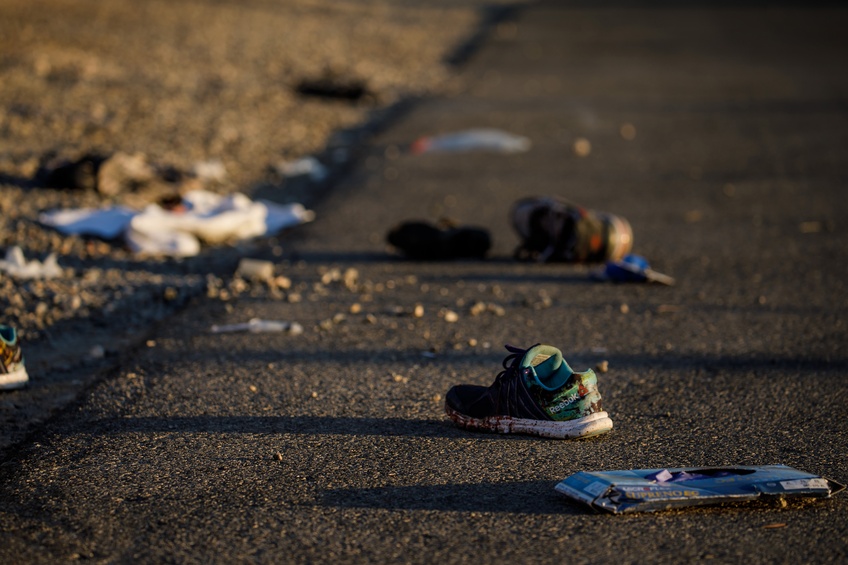Late Sunday evening shots rang out, echoing against the buildings on the Las Vegas Strip.
It’s easiest to cope with terror threats and events when they’re thousands of miles away, but the biggest mass shooting in U.S. history happened in our backyard.
Sixty-four year old Stephen Craig Paddock checked into a Mandalay Bay hotel room Thursday, and shot down into a crowd of about 22,000 people Sunday evening as they watched one of the last sets of the three-day Route 91 music festival. Authorities discovered Paddock in his room when the smoke from the gun set off the smoke detector, and with him they found nine other guns.
Videos of the event show festival-goers in confusion as gunfire replaces country music and thousands of people rush to take shelter.
Paige Morrison was amongst the crowd cheering on Jason Aldean just after 10 p.m. on Sunday night. The junior criminal justice major studying at Nevada State College recalls the moments in which sounds of gunshots reverberated across the valley.
“All I know is that I can’t get the sound of bullets flying through the air and the sound it made off of the hotels around me [out of my head],” Morrison said. “The sound was like nothing I’ve heard before and it is forever in my brain.”
Morrison said she remembers running and jumping over people to take cover. When the second round of bullets began, she said her boyfriend leapt on top of her to shield her from the spray.
“When the shots would stop, I remember getting up and running and when they would start again I could see people just falling to the ground because they were hit,” Morrison said.
Morrison said she does consider this an act of terrorism.
“Terrorism, to me, is when someone decides to violate my freedom and makes the decision to attack innocent people,” she said.
Hunter Cordova is a sophomore physical therapy major at Southern Utah University, but has a permanent residence with her family in Las Vegas. She first heard the news through her family, who were first responders on the scene.
“It made me feel terrified,” Cordova said. “I was literally on my toes the entire night, watching the news and making sure I didn’t hear [my family’s] names called.”
The number and frequency of mass shootings has made Cordova rethink a lot of the events she has planned on going to, she said.
“[You] have to be cautious when you go [out],” Cordova said. “[If you decide to go to an event] make sure to know all the exit routes.”
Morrison said, on the other hand, the recent events will not keep her from doing things she enjoys.
“I don’t think it will keep me from attending [more events] but it will play a big role on which ones I attend,” Morrison said. “Don’t let fear stop you from living your best life. We can be scared of things but that not should paralyze us and keep us from doing what we want.”
Anthony Phillippe, a freshman general education major studying at the University of Nevada Las Vegas, was on campus when the shots broke out.
“We went into lockdown,” Phillippe said. “At first I thought it was just a threat, but when I went on social media I found it was so much more.”
Phillippe said the worst thing he and his friends could have done was sit around and let their minds wonder while scrolling through social media.
“Just sitting there, unable to leave and unable to stop refreshing the page made it so much worse,” Phillippe said. “Especially when there were [supposedly] so many shootings and possible bombings that didn’t even turn out to be real.”
When traditional news seemed to be going too slow, people flocked to Twitter as their main news source. The social media platform exploded with conspiracy theories and unreliable information about other suspected shooters or possible bomb threats. This recycling of misinformation helped fuel the fear coursing through thousands as they sat waiting to hear back from friends and family.
“I think it’s so easy to believe everything you read when fear is involved,” Phillippe said. “The best thing to do is take a step back, take a breathe [and] think it through.”
Dr. David Tate is a local psychologist who helps individuals in a multitude of areas including coping skills.
“Our instinctual response is to either fight or flee or freeze,” Tate said. “We tend to do what is most needed in the moment to protect ourselves.”
Tate said this is less about fear and more about trauma. Thousands of people were directly traumatized in the events that occurred Sunday, but millions more watching those affected experienced secondary trauma, he said.
“We need to recognize that we are reactive, [and] that we are in a self-protective state,” Tate said. “Some things that are helpful for people to do is to reach out for support from friends, or professional support if it's something that keeps persisting.”
If obsessive and intrusive thoughts persist for noticeable periods of time, Tate said there is a need to reach out for support.
“Reach out [to others] for help, but get professional help if there is a need,” Tate said. “Those affected can talk about their feelings and thoughts [with others], and constructively express their feelings and thoughts.”
Tate said some of the ways to constructively express emotions are through talking to a friend, writing, creating visual art, or doing something more symbolic, like donating money or blood.
“Do not isolate yourself, but connect with people to express feelings constructively and to do something—whatever you feel inclined to do—that will make you feel like you've made a difference,” Tate said. “Make sure you're taking care of yourself in the process.”

